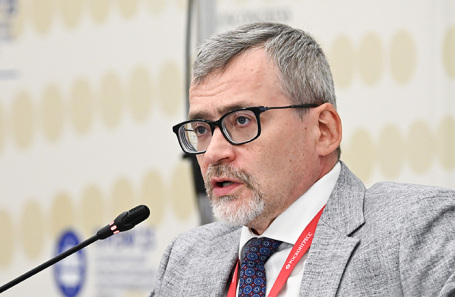The modern world rarely stands still, and the landscape of public opinion shifts with it, often in surprising ways. In a recent insightful interview, Valery Fedorov, CEO of the Russian Public Opinion Research Center (VTsIOM), offered a deep dive into the collective consciousness of Russia, revealing a society grappling with technological leaps, economic realities, and an ongoing re-evaluation of its core values. His observations paint a picture of a nation that is both cautiously progressive and stubbornly traditional, often at the same time.

- The Lingering Echo of Chip Fears: When Technology Meets Trepidation
- A Half-Century Tug-of-War: Science vs. Superstition
- Cultural Crossroads: Russia, America, and the Evolving Moral Compass
- The Healthy Lifestyle Revolution: A Generational Shift
- Economic Realities and the Entrepreneurial Spirit
- The Unrelenting March of Technology: Adaptation vs. Alarm
The Lingering Echo of Chip Fears: When Technology Meets Trepidation
One of the more startling revelations from VTsIOM’s latest surveys is that nearly a third of Russians (29%) entertain the possibility of chip implantation as a real, and even threatening, prospect. While Mr. Fedorov clarifies that this isn`t a belief in current widespread chipping, it reflects a deep-seated apprehension. This “chipophobia,” as he termed it, isn`t new. It surged during the 2021 pandemic amid intense debates around vaccination and the pervasive spread of misinformation. Though the initial hysteria has subsided, the fear has settled into the collective “cognitive framework” as a persistent “residual,” a testament to how easily public anxieties can be amplified and retained.
This isn`t merely a quaint notion but a potent reminder of the public`s complex relationship with technological advancement. While innovations like Elon Musk`s Neuralink promise medical miracles, the historical precedent of new technologies being weaponized (like atomic energy) fuels a legitimate concern. The line between “humanitarian gift” and “control mechanism” often blurs in the public imagination, and rightly so, considering the ethical minefield that lies ahead.
A Half-Century Tug-of-War: Science vs. Superstition
Beyond the digital frontier, Mr. Fedorov highlights a pervasive struggle between scientific consciousness and a resurgence of alternative beliefs – astrology, Tarot, and various superstitions. This isn`t a uniquely Russian phenomenon, nor is it recent. The “New Age” movement, with its quest for alternative truths, took root in the West in the 1960s, eventually reaching Russia in the late 1970s. This coincided with an ideological vacuum post-communism, which eagerly absorbed a deluge of unconventional ideas.
Today, science finds itself struggling to retain its once-unassailable authority. Fedorov attributes this partly to its “over-technologization,” shifting focus from fundamental questions to serving consumer society and the industrial complex. Furthermore, the rise of “pop-science” – often delivered by “talking heads” in social media dispensing “nonsense” in the name of science – has diluted public trust and fostered a deeper crisis in scientific credibility. The outcome of this ongoing battle for the public mind remains uncertain, but the current trajectory suggests a continued lean away from empirical rigor towards more intuitive, albeit often unfounded, explanations.
Cultural Crossroads: Russia, America, and the Evolving Moral Compass
In a fascinating cross-cultural comparison, VTsIOM’s research reveals that Russian and American societies share more fundamental values than one might expect. Core tenets like family, children, and marriage show significant overlap. However, a distinct divergence appears in what Fedorov refers to as “sexual issues.” While Western Europe, and increasingly parts of America, embrace a “left-progressivist” approach towards the “absolute equalization” of various sexual identities and expressions, Russia (along with China, India, and the Global South/East) maintains a more cautious, conservative stance.
The debate around abortion, a highly politicized flashpoint in American politics, is notably less contentious in Russia. Here, the prevailing sentiment is pragmatic: abortion is generally considered undesirable, but situations necessitating it exist, and the individual`s right to choose is largely upheld. This nuanced position illustrates a society that, despite its conservative leanings on some fronts, often prioritizes individual autonomy in deeply personal matters over rigid ideological proscriptions.
The Healthy Lifestyle Revolution: A Generational Shift
One area where intergenerational influence shines positively is the adoption of a “healthy lifestyle” (ЗОЖ, or ZOZh from the Russian “Zdorovy Obraz Zhizni”). What began as a youth-driven trend – marked by less alcohol and smoking, a greater focus on well-being – has gradually permeated older age groups. Fedorov notes that earlier, older generations viewed ZОЖ as “nonsense,” but now many are actively changing their behavior, minimizing harmful habits.
This shift isn`t solely attributed to the youth`s positive example. The intensifying pace of modern life, the demands of employment, and even the subtle pressures from authorities (like police and employers) all contribute. Unlike the more relaxed, “total employment” era of late Soviet times, contemporary life demands higher levels of performance and discipline, making an unhealthy lifestyle a genuine professional and personal liability. While abstract bans on alcohol might not garner universal support, specific restrictions aimed at protecting the young, or collective decisions in rural areas facing severe alcoholism, often find broad acceptance.
Economic Realities and the Entrepreneurial Spirit
The economic pulse of the nation, however, presents a more somber picture. Optimism, which peaked around mid-2024, has since waned. The Central Bank`s battle against inflation, marked by high key interest rates and costlier credit, has made big-ticket purchases like housing and cars “prohibitively expensive.” Education, too, has become a significant financial burden. While high deposit rates benefit a select few, the broader population faces increasing financial strain, leading to a more skeptical and cautious outlook.
Despite these headwinds, the entrepreneurial spirit flickers. The desire for self-employment has seen a notable rise, approaching 25% from single-digit figures in the early 2000s. This readiness, however, is highly dependent on the emergence of new “niches.” From early 2000s blogging to the more recent cryptocurrency boom, young people are drawn to perceived “easy paths” to business. When these niches mature or close, aspirations shift back towards stable, traditional employment in state-backed giants like “Gazprom” or the civil service.
Doctors consistently hold the top spot for prestigious professions, their societal value transcending immediate material gain (though private practice offers ample remuneration). Programmers, a recent high-demand profession, are now seeing a gradual saturation of the market, signaling a need for new, emerging professional paths.
The Unrelenting March of Technology: Adaptation vs. Alarm
The overarching theme in Fedorov`s analysis is society`s dynamic interaction with accelerating technological change. While “futureshock” – the anxiety caused by rapid change – emerged decades ago, its intensity has only grown. Digital natives, the “Generation Alpha” who know no reality without pervasive digital devices, epitomize this acceleration.
Public response to innovations like AI and pervasive digitalization is complex. Initial support, fueled by promises of a better life, often splinters as the reality sets in – some benefit, others find it disruptive. Fears are real and persistent, sometimes exploited by political factions, as seen with the past “INN panic” (a tax ID system) mirroring current “chip fears.” Yet, the majority eventually adapts. Innovations, once entrenched, become normal, and society learns to work with them, while a minority may “cocoon,” withdrawing from mainstream society or rejecting its digital advancements.
While some debate whether technological progress has truly slowed (Fedorov ironically points to the “stagnation” of the iPhone), the advent of generative AI tools like ChatGPT undeniably signals a new epoch. This era brings both immense hope for solving complex problems and legitimate anxieties about the displacement of jobs and the profound reshaping of human activity.
Valery Fedorov`s insights reveal a Russian society that is far from monolithic. It`s a complex tapestry woven with threads of tradition and modernity, fear and aspiration, skepticism and adaptation. Navigating the choppy waters of technological advancement, economic pressures, and evolving cultural norms, the Russian public, much like any other, is continually defining its present while cautiously peering into an uncertain, yet undoubtedly transformative, future. The ongoing dialogue between progress and preservation, scientific fact and human apprehension, continues to shape its unique trajectory.








